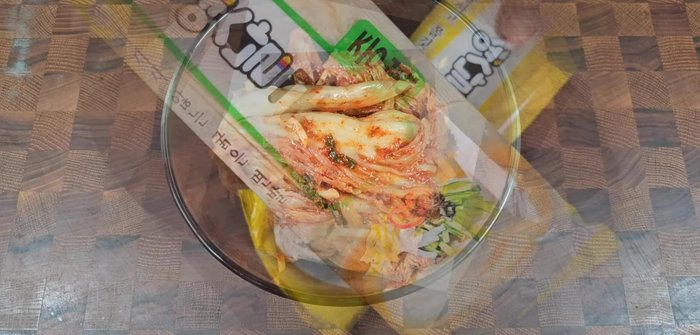Kimchi bibim guksu, a vibrant and intensely flavorful Korean noodle dish, offers a delightful explosion of spicy, sour, and savory sensations in every bite. This refreshing cold noodle salad is perfect for a hot summer day or anytime you crave a quick, satisfying meal packed with authentic Korean tastes. The combination of chewy noodles, tangy kimchi, and a variety of colorful vegetables creates a culinary masterpiece that's both simple and sophisticated. Its customizable nature allows for easy adjustments to spice levels and ingredient preferences, ensuring a personalized experience for every palate.
This recipe provides a delicious and authentic take on kimchi bibim guksu, perfect for both seasoned cooks and enthusiastic beginners. Ready to experience the magic of this iconic Korean dish? Let's dive into the simple, step-by-step instructions that will guide you to creating your own bowl of this unforgettable culinary delight.
Tools Needed
- Chopsticks
- Pot
- Colander
- Bowl
Ingredients
- Thin or medium noodles: 400g
- Fresh kimchi: 400g
- Gochujang (Korean chili paste): 3 tablespoons
- Tuna liquid: 3 tablespoons
- Sugar: 1/2 tablespoon
- Plum extract: 5 tablespoons
- Minced garlic: 1 generous spoon
- Sesame oil: 2 tablespoons
- Sesame seeds: 2 tablespoons
Step-by-Step Instructions
Step 1. Prepare the Kimchi and Seasoning
- Prepare 400g of fresh kimchi (the main ingredient).
- Rinse the kimchi seasoning lightly to reduce its strong sour taste. Squeeze out excess water and slice into 1cm intervals.
- Mix 3 tablespoons gochujang, 3 tablespoons tuna liquid, 1/2 tablespoon sugar, 5 tablespoons plum extract, 1 generous spoon of minced garlic, and 2 tablespoons sesame oil.
- Add the sliced kimchi to the seasoning and mix well.




Step 2. Cook and Prepare the Noodles
- Prepare noodles. Thin or medium thickness is recommended. Avoid overly thick noodles that are difficult to eat with chopsticks.
- Boil the noodles according to package instructions.
- Immediately rinse the cooked noodles under cold water to remove excess starch. Rub gently and change the water three times.



Step 3. Combine and Season the Noodles
- Drain the noodles well and add them to the prepared kimchi seasoning. Add 2 tablespoons of sesame seeds.
- Mix thoroughly, ensuring the noodles are evenly coated with the seasoning.


Read more: Glass Noodle Stir-fry with Shrimp & Veggies: Easy Korean Recipe
Tips
- If the kimchi seasoning is too strong, rinse it lightly before adding it to the noodles.
- Thoroughly wash the noodles to remove excess starch for optimal texture.
Nutrition
- N/A
FAQs
1. Can I use pre-made kimchi?
Absolutely! Pre-made kimchi works perfectly. Just adjust the amount based on its spiciness level.
2. What type of noodles are best for Bibim Guksu?
Thin wheat noodles (like those used for japchae) are traditional and hold the sauce well. However, you can experiment with other noodles too!
3. How can I adjust the spiciness?
Control the spiciness by adjusting the amount of gochujang (Korean chili paste) and kimchi you use. You can also add more or less gochugaru (Korean chili flakes).
So there you have it – your own delicious bowl of kimchi bibim guksu! This vibrant dish is a testament to the beauty of simple ingredients combined with bold flavors. Enjoy the refreshing coolness and satisfying spice, and don't hesitate to experiment with your favorite additions to make it your own.
